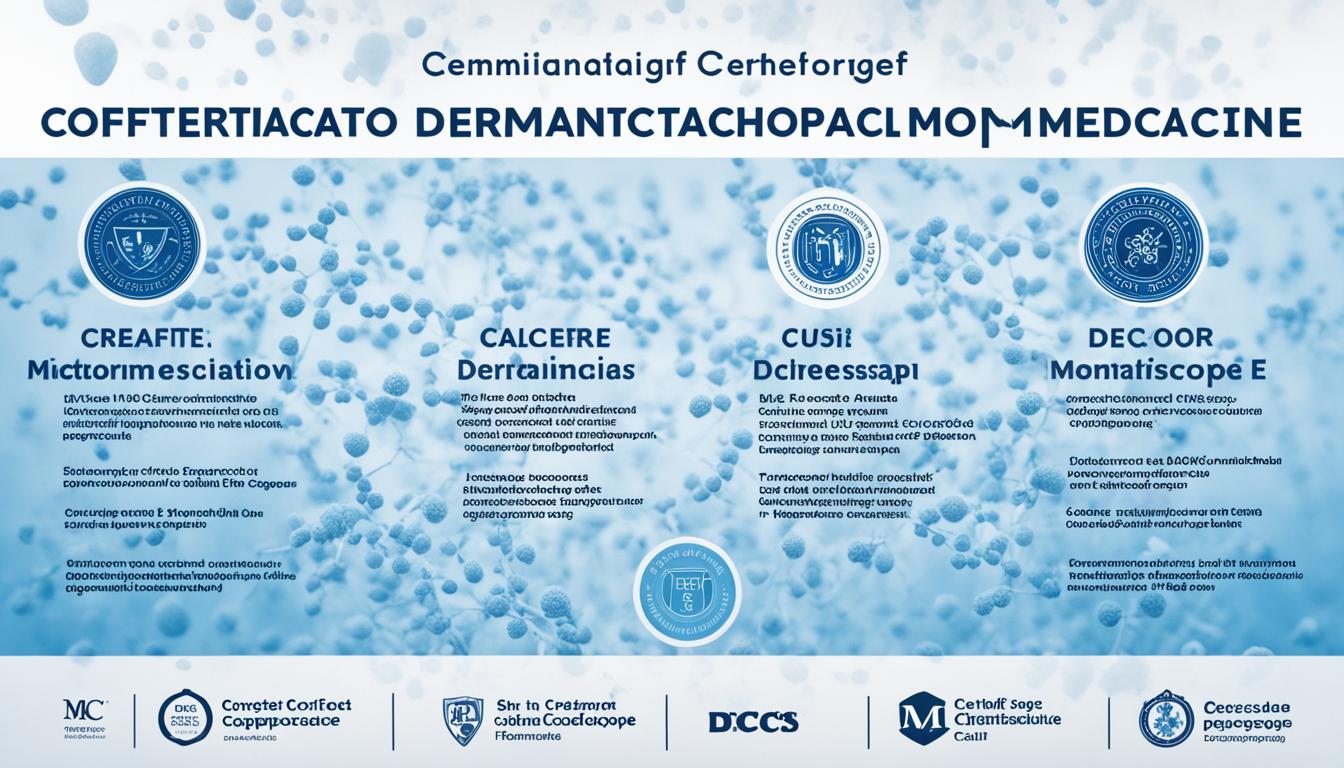What is an MSc in Dermatological Medicine?
Did you know skin cancer is the most common cancer worldwide?
An MSc in Dermatological Medicine is a postgraduate course. It gives in-depth knowledge in dermatology. This course is for doctors who want to specialize in skin health.
Students will learn about skin diseases and how to treat them. They study anatomy, physiology, and how drugs affect the body. They also learn the newest ways to diagnose and treat skin problems.
Key Takeaways:
- An MSc in Dermatological Medicine helps you understand skin diseases better.
- It teaches you how to prevent and find skin cancer.
- Students will be experts in medicine and new dermatology methods.
- They can become dermatologists who care for people with skin issues.
- Dermatology is a field with more jobs because skin problems are increasing.
Career Opportunities in Dermatological Medicine
A degree in dermatological medicine offers many career paths, with dermatology being a key area. Dermatologists are doctors who focus on skin issues. They are very important in healthcare.
They work in various places like private offices, hospitals, and labs. They help people with skin conditions feel better. They may treat patients or do research.
The need for dermatologists is growing. Almost 50 million Americans have skin issues every year. This shows how much their work is needed.
As a dermatologist, you can help by identifying and treating skin problems like eczema and skin cancer. You can focus on areas like kids’ skin problems or improving how skin looks.
Dermatologists also do important research. They help develop new treatments by studying skin diseases. This work is vital in making treatments better for patients.
“Being a dermatologist allows me to combine my passion for medicine with my love for aesthetics. I get to help people feel confident and comfortable in their own skin while continuously learning and exploring new treatment methods.”
If you love skin health and helping people, dermatological medicine is a great choice. It can be both rewarding and meaningful.
There are many career paths to explore in this field. Start a journey that’s all about helping and discovering.
| Career Path | Responsibilities |
|---|---|
| Dermatologist in Private Practice | Diagnose and treat various skin conditions, perform procedures, prescribe medications, and provide ongoing patient care. |
| Dermatologist in Hospitals | Work in a hospital setting, collaborate with other specialists, diagnose and treat complex dermatological cases, and perform procedures. |
| Clinical Research | Conduct groundbreaking research, clinical trials, and studies to develop new treatments and improve existing therapies. |
| Academic Dermatology | Teach medical students, residents, and fellows, engage in research, and contribute to advancing dermatological knowledge. |
| Cosmetic Dermatology | Perform cosmetic procedures, such as Botox injections, laser treatments, and chemical peels, to enhance skin appearance and address aging concerns. |
Dermatological Medicine Curriculum
An MSc in Dermatological Medicine covers many subjects directly linked to skin health. This program gives students a broad view of dermatology. It provides them with the required skills and knowledge for a thriving career in this field.
Participants will study medical sciences like anatomy, physiology, and how drugs work in the body. Knowing these helps understand the body and learn about skin problems.
Students will also learn to diagnose and treat skin conditions. They’ll look at symptoms, do tests, and make treatment plans. This practical experience helps them become skilled at treating patients.
The dermatological medicine curriculum also covers other key areas. These include:
- Immunology: Understanding how the immune system affects skin health
- Microbiology: Exploring how germs impact skin conditions
- Histology: Learning about the microscopic structure of the skin
Besides the main topics, the program might include lessons in managing, writing grants, and solving problems. These extra skills help professionals deal with tough issues in dermatology. It keeps them up-to-date with the latest in the field.
The MSc in Dermatological Medicine gives a well-rounded education. Graduates come out with medical and practical skills. They’re ready to do well in dermatology jobs and make meaningful contributions to the field.
Benefits of Studying Dermatological Medicine
Learning about Dermatological Medicine has many benefits. It allows you to understand the skin better and how to care for it. The skin is important for health, being the body’s largest organ. Knowing dermatology well helps in treating skin problems, improving people’s lives.
“Dermatologists are trained healthcare professionals who can diagnose and treat over 3,000 skin conditions,” says Dr. Jennifer Davis, a renowned dermatologist at XYZ Dermatology Clinic. “Studying Dermatological Medicine equips individuals with the skills and knowledge needed to become proficient in this specialized field.”
Dermatological issues are often complex and varied, making diagnosis and treatment hard. Learning about them thoroughly helps students meet these challenges. They study many ways to diagnose and treat skin problems. This knowledge helps create tailored plans for patients.
The field of dermatology is always growing, with new research and treatments. Choosing an MSc in Dermatological Medicine helps you stay up to date. You’ll be able to do research, work with other experts, and find new ways to help patients. This keeps dermatologists on the cutting edge of healthcare.
Studying Dermatological Medicine means more than helping one person at a time. Dermatologists also work in public health, fighting diseases like skin cancer. They teach about taking care of your skin, find skin problems early, and help keep skin healthy. By learning dermatology, you help the whole community stay healthy.
| Benefits of Studying Dermatological Medicine |
|---|
| Develop a comprehensive understanding of dermatology |
| Enhance diagnostic and treatment skills |
| Stay updated on advancements in research and technology |
| Contribute to the field’s progress |
| Improve patient outcomes and overall skin health |
| Play a vital role in public health |
“Studying Dermatological Medicine opens up a world of opportunities,” shares Dr. Sarah Thompson, a leading dermatologist at ABC Dermatology Center. “It’s a rewarding field where you can make a significant impact on patients’ lives and contribute to advancing skin health.”
Research Focus in Dermatological Medicine
Dermatological Medicine focuses on skin biology research. This research helps understand skin diseases better. It also leads to better ways to diagnose and treat these diseases. This improves how we take care of patients.
Research in Dermatological Medicine includes many areas. For example, it looks into how the skin grows and matures. Also, it studies how skin cells change to do different jobs. These studies are important for skin health.
- Skin development: Investigating the processes involved in the growth and maturation of the skin, leading to a deeper understanding of its structure and function.
- Differentiation: Studying how different types of cells in the skin differentiate and specialize to perform specific functions, contributing to the overall health and integrity of the skin.
- Stem cell biology: Exploring the potential of stem cells in skin regeneration, wound healing, and regenerative medicine.
- Tissue repair and regeneration: Investigating the mechanisms behind the body’s natural ability to repair and regenerate damaged skin tissues.
- Native and adapted immunity: Understanding the immune responses of the skin and how they contribute to the defense against infections and autoimmune disorders.
- Genetic disorders: Examining the genetic factors that contribute to various dermatological conditions, shedding light on their causes and potential treatment options.
Researchers in Dermatological Medicine work hard. They discover new things about skin health. They come up with new ways to treat skin problems. These efforts make patient care better.
Advancements in Dermatological Medicine Research
“Dermatological Medicine research looks into the complex nature of the skin and its diseases. By focusing on the details of skin biology, we get important new insights. These insights help us create new treatments. A team approach in research can change the lives of those with skin conditions.” – Dr. Julia Thompson, Dermatologist and Research Scientist
Research in Dermatological Medicine is critical. It leads to better diagnosis and treatment. Plus, it helps us understand how skin diseases work. By doing more research, doctors and scientists can offer better care and help the field grow.
Admission Requirements and Deadlines
To join an MSc in Dermatological Medicine, students often must meet specific requirements. Every school might have its own rules. So, it’s smart to look on the school’s website for details. Usually, you’ll need a background in premedicine or a related field like biology. This helps set the stage for more focused study in dermatology.
Deadlines for applying to MSc programs in Dermatological Medicine can change. Start your application as soon as you can. Early applications have a better chance of being accepted. Deadlines are set for all students, whether local or from elsewhere, and for different fee groups. This is to make things fair for everyone.
Here’s the normal application process and when things are due:
| Application Type | Deadline |
|---|---|
| Early Application | October 1st |
| Standard Application | January 15th |
| Final Application (Overseas Students) | March 15th |
| Final Application (Home Fee Status) | July 1st |
But remember, these dates could change. So, always check the program’s site for the latest deadlines. This ensures you won’t miss anything.
In short, following admission rules and deadlines is key when applying for an MSc in Dermatological Medicine. By knowing and meeting these requirements, your chances of being accepted goes up. This could lead you to an exciting career in dermatology.
Unique Aspects of the Program
The MSc in Dermatological Medicine stands out among similar programs for several reasons. It dives deep into medical sciences and dermatology. But it also goes beyond, teaching skills vital for a career in dermatology. These include:
- Management and grant writing: This course teaches students how to handle the business side of dermatology. They learn to run medical practices, write research grant proposals, and create business plans for clinics.
- Problem-solving for regulatory matters: Students get to grips with the rules and ethics in dermatology. This means they know how to keep patient data safe and follow safety protocols.
- Enterprise formation issues: The program shines a light on starting a dermatology business. It helps graduates be ready to open their own practices or clinics.
- Clinical problem-solving: A crucial focus is on solving challenging dermatological cases. This skill lets students diagnose and treat skin issues effectively.
The program ensures graduates are ready for the highs and lows they’ll face. It mixes medical know-how, business skills, and the ability to solve tough problems. This way, it helps dermatology professionals stand out and improve patient care.
Application Process
Applying to the MSc in Dermatological Medicine program is easy and straightforward. Prospective students start by submitting an online application on the institution’s website. This form is easily found on the program’s page and can be filled out whenever it suits the applicant.
It’s best to apply early. This gives enough time for your application to be carefully reviewed. Applying early secures a place before the program is full. Be aware that application deadlines may differ from institution to institution.
During your application, the school might ask for more information or documents. Be ready to provide things like academic transcripts, a statement of purpose, and letters of recommendation. Submitting all requested documents on time makes the process smoother.
Pay close attention to the application deadlines. There are usually different deadlines for early and final applications, whether you’re applying from abroad or locally. Missing these deadlines might mean your application won’t be reviewed.
After submitting your application, the admissions committee will review it carefully. They will look at your academic background, relevant experiences, personal statement, and references. This review process could take a few weeks. It’s a good idea to check your application status regularly during this time.
If your application is successful, you will receive an admission offer to the MSc in Dermatological Medicine program. Accepted students will get more information on how to enroll, register for courses, and any orientation programs. This starts the next chapter of your academic journey.
The program’s application process aims for a fair and complete evaluation of each applicant. By meeting all the application requirements on time, you can boost your chances of being accepted. Good luck!
Program Duration and Degree Attainment
The MSc in Dermatological Medicine program gives students a broad understanding of the field. The length of the program can change depending on the school and what’s required. Typically, students will spend 1-2 years to complete their studies.
The time needed for the program changes with full or part-time study. Plus, if there are any research portions. Full-time students might finish quicker than part-time students. This depends on how many courses they take each semester.
During their studies, students will take classes, tests, and get hands-on practice. This helps them become experts in diagnosing and treating skin problems. After finishing all requirements, they will earn an MSc degree in Dermatological Medicine.
Here’s a look at what students will do and when they’ll finish:
- Coursework: You will take a mix of required and chosen courses in medicine and dermatology. The number and type of courses can differ at each school. Check the school’s program to see what’s offered.
- Examinations: You’ll be tested on what you’ve learned through these exams. They might include written tests, using what you know practically, and presenting your findings.
- Research Component: Some programs have you complete a research project. This gives you the chance to add to the knowledge in dermatology and improve your research skills.
- Clinical Training: Along with classes and research, you might also get to work with patients during your studies. This part can happen in hospitals, clinics, or other health centers.
If you finish all these parts successfully, you become a graduate with an MSc in Dermatological Medicine. You’re ready to start a career in this field or areas that link with it.
| Program Milestone | Duration |
|---|---|
| Coursework | Varies depending on the program and course load (typically 6-12 months) |
| Examinations | Varies depending on the program and examination schedule (typically 1-3 months) |
| Research Component | Varies depending on the program and research requirements (typically 6-12 months) |
| Clinical Training | Varies depending on the program and clinical training schedule (typically 3-6 months) |
Note: The times given above are approximations and can change by school. Always check the specific program and school’s calendar for the most up-to-date information.
Conclusion
Getting an MSc in Dermatological Medicine gives you a deep dive into skin and its issues. This course helps you become a dermatologist. Graduates can help people with many different skin problems.
Choosing to study this field opens up many job opportunities. As skin issues grow, so does the need for experts. This career lets you diagnose and treat skin diseases. Thanks to new research and tech, the field is always changing, offering chances to learn and grow more.
This MSc program is perfect for those who love learning about skin health. It gives you the latest info, skills, and practical experience. With this degree, you start a rewarding career in dermatology. You get to help patients and push the field forward.
FAQ
Q: What is an MSc in Dermatological Medicine?
A: An MSc in Dermatological Medicine is for medical grads who want to be dermatologists. It focuses on dermatology. This program lets them understand dermatological diseases deeply.
Q: What are the career opportunities in Dermatological Medicine?
A: After this program, you can work as a dermatologist. Jobs are in private practice, hospitals, clinics, or labs. The need for expert skin care is growing.
Q: What does the Dermatological Medicine curriculum cover?
A: The curriculum includes medical sciences like anatomy and physiology. It also has classes in diagnosis and skin condition treatment. Students study immunology, microbiology, and more.
Q: What are the benefits of studying Dermatological Medicine?
A: It deepens your knowledge of skin and its disorders. You learn to tackle dermatological issues. You also keep up with new field advancements.
Q: What is the research focus in Dermatological Medicine?
A: Research focuses on skin biology, tissue repair, genetic disorders, and immunity. This research helps find new ways to diagnose and treat skin diseases.
Q: What are the admission requirements and deadlines for Dermatological Medicine?
A: To get in, you’ll usually need premedicine or similar undergrad studies. Be sure to check the program’s site for specific admission details.
Q: What are the unique aspects of the Dermatological Medicine program?
A: This program blends medical science with dermatology. You also learn management and problem-solving. Graduating prepares you for a successful dermatology career.
Q: What is the application process for the Dermatological Medicine program?
A: Apply online on the school’s website. They might ask for more details later. It’s smart to apply early with all required documents.
Q: How long does the Dermatological Medicine program take to complete?
A: It usually takes 1-2 years, depending on study mode and additional research. This includes full-time or part-time study.
Q: What is the conclusion of studying Dermatological Medicine?
A: Studying MSc in Dermatological Medicine gives you a deep understanding of skin. It prepares you for becoming a successful dermatologist and making a difference.







